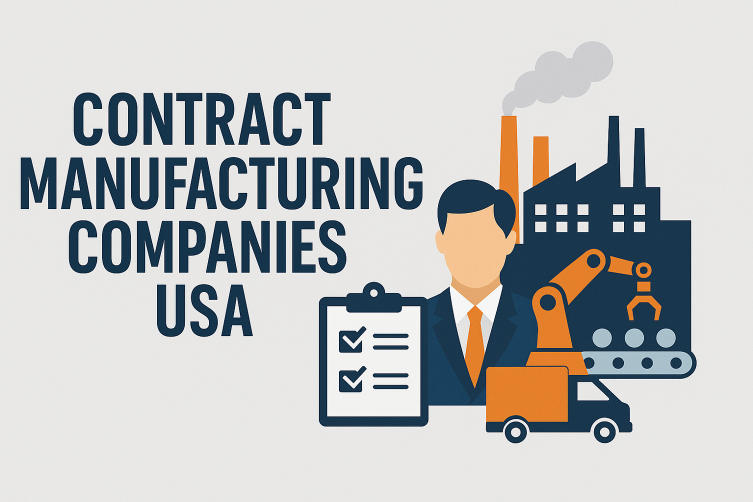In an increasingly complex and fast-paced global economy, businesses are turning to contract manufacturing companies to streamline production, reduce costs, and accelerate time to market. The United States, long a hub of industrial innovation and quality standards, boasts a dynamic contract manufacturing sector that serves industries ranging from pharmaceuticals and electronics to aerospace and consumer goods.
This article provides an in-depth look at the role of contract manufacturing companies in the U.S., their benefits and challenges, major players, selection criteria, and how they’re shaping the future of American manufacturing.
What Is Contract Manufacturing?
Contract manufacturing is a form of outsourcing where a company hires a third-party manufacturer to produce components, assemblies, or finished products under their brand. While the hiring company (the client) focuses on product design, branding, and sales, the contract manufacturer (CM) handles all or part of the production process, often including procurement, quality assurance, and packaging.
This model is widely used across sectors where capital investment in manufacturing infrastructure is prohibitive, or where companies want to focus on their core competencies.
Contract Manufacturing vs OEM
Though often used interchangeably, Contract Manufacturing and OEM (Original Equipment Manufacturing) differ slightly:
- Contract Manufacturing: The client typically provides the design, and the CM manufactures it, often offering additional services like sourcing, assembly, and logistics.
- OEM: The OEM might design and manufacture parts or products which are then sold under another brand’s name.
The key distinction is often in ownership and initiative of the design and IP.
Why Companies Choose U.S.-Based Contract Manufacturers
The United States has maintained its reputation for high-quality standards, regulatory compliance, and technological leadership in manufacturing. Companies choose U.S.-based contract manufacturers for a variety of strategic reasons:
1. Proximity and Communication
Local manufacturing simplifies logistics, shortens lead times, and facilitates easier collaboration, especially for complex products that require tight feedback loops.
2. Quality Assurance
U.S. contract manufacturers adhere to rigorous quality standards such as ISO, GMP, and FDA compliance, particularly critical for industries like aerospace, medical devices, and pharmaceuticals.
3. IP Protection
American legal frameworks offer stronger protections for intellectual property compared to many offshore alternatives.
4. Supply Chain Stability
Manufacturing domestically reduces exposure to geopolitical tensions, tariffs, and international shipping disruptions.
5. Support for Branding and Marketing
“Made in USA” continues to be a valuable label, especially in premium and regulated markets.
Key Industries Leveraging U.S. Contract Manufacturers
1. Pharmaceuticals and Biotechnology
The U.S. pharma sector depends heavily on CDMOs (Contract Development and Manufacturing Organizations) for formulation, clinical trial production, and commercial-scale manufacturing. FDA-registered facilities must meet strict cGMP standards.
2. Medical Devices
From surgical tools to wearable health tech, U.S. contract manufacturers provide precision engineering, documentation support, and regulatory compliance.
3. Electronics
Printed circuit board assembly (PCBA), SMT lines, and final system integration are commonly outsourced, particularly for high-mix, low-volume products.
4. Aerospace and Defense
Given the critical nature of reliability and compliance, contract manufacturing in this sector requires certifications like AS9100, ITAR registration, and extensive traceability.
5. Consumer Products
Private-label goods ranging from cosmetics and beverages to exercise equipment are often produced by U.S. contract manufacturers with turnkey capabilities.
6. Industrial and Heavy Equipment
Complex assemblies, welding, machining, and painting for machinery and equipment are commonly outsourced in sectors like agriculture, mining, and energy.
Benefits of Working with U.S. Contract Manufacturing Companies
– Cost Efficiency
While labor costs in the U.S. are higher than overseas, efficiencies gained through automation, reduced waste, and fewer shipping-related risks can balance the scale.
– Faster Turnaround Times
Proximity to customers, faster prototyping, and localized supply chains help in quicker go-to-market strategies.
– Regulatory Confidence
Whether it’s the FDA for medical and food products or the FAA for aerospace components, U.S. CMs are well-versed in domestic regulatory expectations.
– Scalability
Contract manufacturers can adjust production volumes as needed, providing flexibility to clients with fluctuating demand.
– Innovation Support
Many U.S. CMs offer R&D support, DFM (design for manufacturing) consulting, and rapid prototyping.
Challenges in the Contract Manufacturing Model
Despite the advantages, there are also notable risks and drawbacks:
– Loss of Control
Outsourcing production can lead to less oversight on quality and process execution unless carefully managed.
– Dependency
Relying on a single CM can become a vulnerability if the manufacturer experiences financial or operational issues.
– Integration Issues
Merging third-party production into a company’s ERP or quality systems can pose logistical and technical challenges.
– High Entry Costs
Initial tooling, setup fees, and small production runs can be expensive, especially for startups.
– Capacity Constraints
Popular contract manufacturers may have long lead times or minimum order requirements that don’t align with early-stage business needs.
Top U.S. Contract Manufacturing Companies (Examples)
1. Jabil Inc.
Headquartered in St. Petersburg, Florida, Jabil is one of the largest contract manufacturers in the world. It provides services in electronics, healthcare, packaging, and industrial solutions.
2. Flex Ltd.
Though incorporated in Singapore, Flex maintains extensive U.S. operations and serves clients across healthcare, automotive, and tech sectors.
3. Sanmina Corporation
Based in San Jose, Sanmina specializes in electronic manufacturing services (EMS), particularly in telecom, medical, and aerospace industries.
4. Phillips-Medisize
A leader in the medical contract manufacturing space, Phillips-Medisize provides integrated design and production solutions for drug delivery devices and diagnostics.
5. Celestica
With U.S. facilities supporting aerospace and defense manufacturing, Celestica is known for high-reliability electronic systems and complex integration.
6. Biomerics
Focused on interventional medical devices, Biomerics provides vertically integrated manufacturing services and is FDA registered.
7. Pacmoore
A food-grade contract manufacturer that provides blending, packaging, and supply chain services for leading food brands.
Steps to Selecting a U.S. Contract Manufacturing Partner
Choosing the right partner is critical. Consider the following:
1. Define Your Needs
Clarify volume requirements, lead times, technical specs, and compliance needs before beginning your search.
2. Evaluate Technical Capabilities
Ensure the CM has the equipment, certifications, and experience to meet your requirements.
3. Check References and Track Record
Investigate prior client relationships, project complexity, and customer satisfaction.
4. Audit Quality Systems
Review their quality control processes, ISO certifications, and ability to trace components.
5. Assess Cultural and Communication Fit
Transparent communication and a collaborative mindset are essential for long-term success.
6. Negotiate IP and Confidentiality Protections
Use NDAs and clearly define ownership of tooling, designs, and documentation.
Trends Shaping the U.S. Contract Manufacturing Landscape
1. Reshoring and Nearshoring
Post-pandemic, many companies are reconsidering overseas manufacturing in favor of U.S. operations to enhance resilience and reduce supply chain risk.
2. Automation and Smart Manufacturing
U.S. CMs are adopting robotics, AI, and IIoT to increase throughput and reduce reliance on labor, making domestic production more competitive.
3. Sustainability
Eco-conscious clients are demanding greener practices, from energy-efficient production to sustainable packaging.
4. Digital Integration
Digital twins, cloud-based collaboration, and ERP integrations are becoming standard for seamless project management.
5. Customization at Scale
Demand for personalization has led to increased need for flexible batch production capabilities, supported by digital manufacturing.
Case Study: A Startup Scaling with a U.S. CM
A consumer electronics startup designing smart home sensors faced high production costs and long shipping delays with an overseas CM. After shifting to a U.S.-based contract manufacturer, they achieved:
- 40% faster lead times
- 20% reduction in defect rates
- Improved customer trust due to the “Made in USA” label
- Easier collaboration on product iterations and testing
This case illustrates the growing appeal of domestic contract manufacturing for agile and quality-focused businesses.
Conclusion: The Strategic Value of U.S. Contract Manufacturing
Contract manufacturing companies in the USA provide a powerful platform for innovation, growth, and operational efficiency. From startups looking to scale without infrastructure investment to multinational corporations optimizing supply chains, U.S.-based CMs offer reliability, compliance, and high-quality output.
However, success in this model depends on careful selection, well-defined processes, and strong communication. As the industry continues to evolve with technology and shifting global dynamics, U.S. contract manufacturers will play an increasingly vital role in driving industrial resilience and competitiveness.






